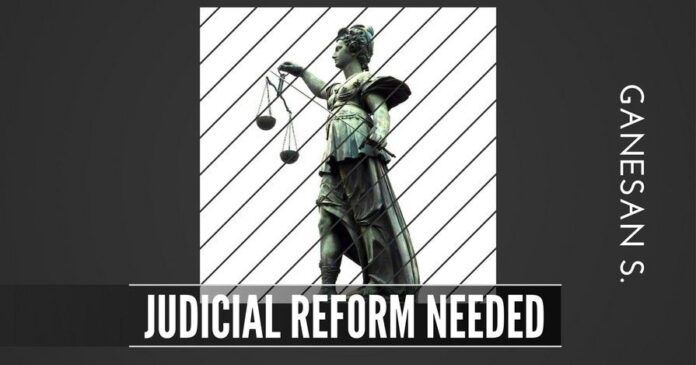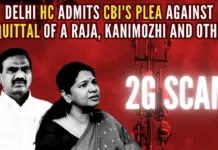
Mr. J. Gopikrishnan, in his well-researched Op-Ed article in Daily Pioneer, has explained why the Saini judgment is flawed, not only in the backdrop of SC judgment cancelling the 2G Licenses[1], but also based on several observations of Saini himself in the course of the trial.
This is about real loss of revenue to the Government (which means to the people of India), on account of patently biased distribution of a 2G spectrum, a property whose value cannot be easily estimated, but easily worth tens of thousands of crores of if not lakhs of crores.
The person best equipped to argue the 2G verdict legally is Dr. Swamy, who has cogently argued why this judgment is legally incorrect, despite the deliberate botching up by those in the present & past Governments, including politicians and officers in various Government agencies[2] owing their allegiance to Congress, and how all this can and should be set right in the higher courts within months, and what he himself intends to do.
This article is on a basic point, about how the aam aadmi feels our justice delivery system has become dysfunctional and broken down.
We all know fully well that another Judge may have come to exactly opposite conclusions based on the very same trial information. So, the judgment is less dependent on the case and the trial, and more on the judge. How can that be?
Everyone knows that the loss to the Government on account of the 2G scam was of the order of several tens of thousands of crores even if one were to ignore the well-argued 1.76 lakh crores loss theory propounded by the CAG. In a scam of this nature, you can’t obviously put your fingers on a single value as the loss to the nation, because we are not talking about some money locked up in a vault that is stolen. This is about real loss of revenue to the Government (which means to the people of India), on account of patently biased distribution of a 2G spectrum, a property whose value cannot be easily estimated, but easily worth tens of thousands of crores of if not lakhs of crores. Later events like e-auction of 2Gand 3G spectrum have clearly proved the loss was phenomenal.
But we are told by legal luminaries how, if the CBI had chased the money trail of the small amounts (about Rs 200 crores paid to Kalaignar TV), and proven corruption to the hilt, instead of going after the thousands or lakhs of crores that the nation has lost, the case may have been more easily won. So, what they say is that our legal system doesn’t bother so much about the actual facts of the case, but only about what is more easily provable. That is, even a scam involving Rs 1.76 lakh (or 60,000) crore loss to the nation should have been argued as a mere Rs 200 crore corruption case, only to prove the case more easily. That’s legal system, for you.
Let’s imagine that a Registrar in-charge of property transfers illegally and wantonly registers your house property worth lakhs of Rupees to a local Don, taking a bribe of Rs 50,000. If we go by the above logic, the usurper can get away with it just by arguing that you can’t prove exactly how much the value of your property was worth, because there is one Property Tax value and many market values. If you file a case of fraud in the above instance, will you say the fraud amount is equal to the bribe of Rs 50,000 or the value of your property worth lakhs of Rupees?
The legal system has got so mired in technicalities, splitting hairs, that the main charge of fraud is less important, and the only thing that matters is proving the guilt of the accused to the hilt, without an iota of doubt.
A Public Interest Litigation (PIL) should be filed in the SC, preferably with the support of lakhs of right-thinking citizens, to end this unwritten dictum of letting 1000 criminals escape.
In case of a murder, a good lawyer can get the accused acquitted by arguing that while there’s proof of the accused being on the spot firing with a revolver in hand, one bullet from his revolver being missing, the victim having died instantly, and the bullet recovered from the body matching with the bullet of the revolver recovered from the accused, the prosecution has not proved that just a fraction of a moment before firing the bullet, the victim did not die naturally of heart attack.
Though the most important stakeholder is judicial system are the people, no one asks them what kind of legal system they want. Legal fraternity has decided that the basis of jurisprudence should be that 1000 criminals can escape but one innocent should not be punished. So, that’s partly what our courts are doing; letting 1000s of big-ticket criminals escape; that they are still not able to ensure that one innocent is not punished is a different matter.
This is why my article titled, “How To Improve The Quality and Speed of Justice Delivery System: A Retired Judge Provides Solution” becomes relevant. If only the onus of proof of innocence was placed on the accused[3] once prima facie case is established, most of the criminal cases will be closed easily within a few months, and almost none of the criminals will escape. In such a case, no innocent will be punished either.
If crooks, criminals, politicians, and bureaucrats are allowed to escape looting lakhs of crores of public money, in the pretext that we can let 1000 criminals escape, we will have only jungle raj. People in public positions should be put to the strictest levels of scrutiny, and not a single case of cheating should be allowed to escape. Only then democracy will have any meaning. The legal system that we have today only breeds sham democracy.
When there was a breakdown of the national financial system, we had financial reforms in 1991, which we all acclaim as the point of a turnaround in our economy. What we have today is a breakdown of our judicial system. It’s time for a turnaround with Structural Judicial reforms.
A Public Interest Litigation (PIL) should be filed in the SC, preferably with the support of lakhs of right-thinking citizens, to end this unwritten dictum of letting 1000 criminals escape. I think it has a good chance of success. Even if it fails, the people would have sent a strong message to our law-makers and judiciary that we are unhappy with our judicial system.
References:
[1] 2G Court ignored indictment by SC – Dec 23, 2017, DailyPioneer.com and Pioneer Newspaper
[2] Dr Subramanian Swamy Complete Press Conference in Delhi Post 2G Scam Verdict – Dec 21, 2017, PGurus.com
[3] How to Improve The Quality And Speed Of Justice System? A Retired Judge Provides Solution – Nov 13, 2017, PGurus.com
- How BJP can get 33%+ vote share in TN - April 1, 2024
- A transparent, equitable electoral funding alternative - March 19, 2024
- How TN BJP can come to No. 1 or No. 2 in 2024 LS polls - January 11, 2024











[…] 2G Verdict: 1991 Moment For Judicial Reforms: Dec 24, 2017, PGurus.com […]
[…] 2 G Verdict: The Moment For Judicial Reforms – Dec 24,2017, PGurus.com […]
You are right.Time has come to wield a broom in judiciary and its approach to justice.A strong movement is required and it needs to be lead by knowledgeable ,articulate person.At the moment to me only DrSwamy fits the bill.If he can pen down series of steps required so that judiciary works efficiently.Public anger will get greater if judiciary keeps delivering nonsensical judgements like in present 2G and the HC verdict on JJ.tinpot judgements are a clear danger to democracy.Who can bell tinpot judgements?
very true, Judicial Reforms in India is loooooooooooooooong overdue. it should have been initiated 70 years ago, but unfortunately nobody thought about it.
especially, all the Politicians who are charge-sheeted, why, suspected and investigated, should be FIRST SENT TO JAIL, asked them to prove their innocence, and punished with minimum 200 years rigorous imprisonment.
the lawyers also should be SENT TO JAIL, who argue for the Criminlas, and help them escape and prolong the case, in their own vested interest. PUNISHMENT SHOULD BE SEVERE and should break their career, and even their future.
How the public can take it forward? Do we conduct signature campaign or be part of the PIL support base? Public needs to take action even before the govt. could so that the govt. will be forced to take action.
Few SC judges in the past also have stated that the present system is not punishing the majority of criminals. How and who, is going to bring reforms in view of the striking down the NJAC, a procedure to select judges? The only way to prevent corruption is to bring a transparent governance which Modi is doing. We are stuck because of adopting British system, which was meant for British and not for India.